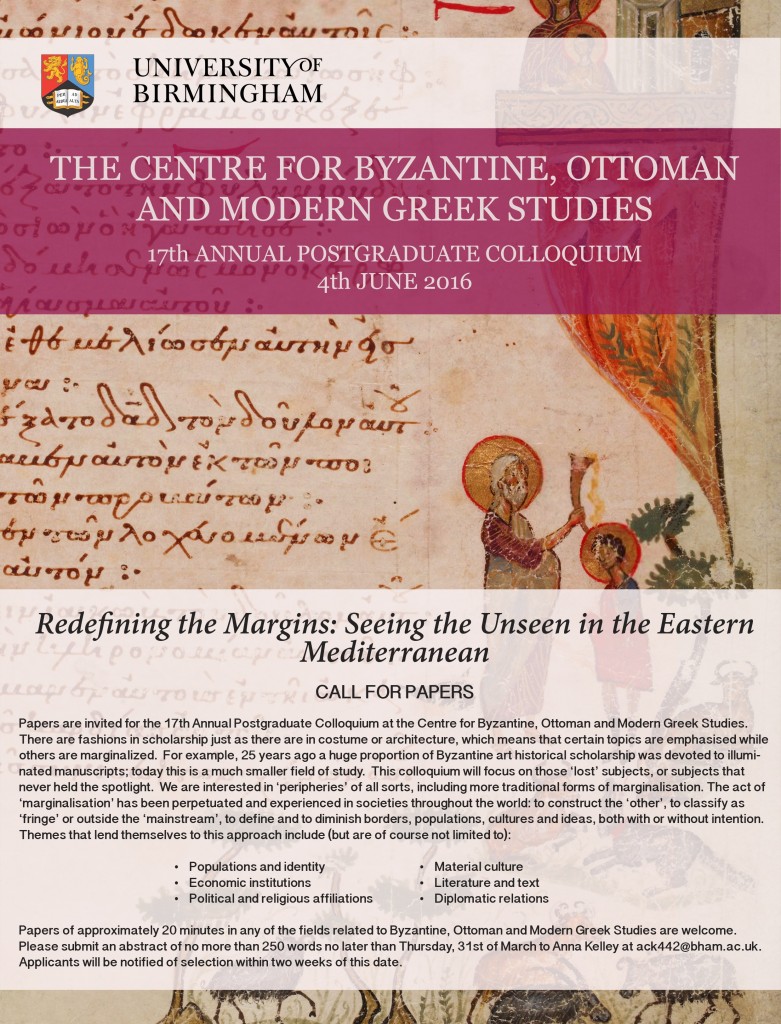PRINCETON UNIVERSITY
Seeger Center for Hellenic Studies
International Graduate Student Conference in Modern Greek Studies
“Works in Progress: New Approaches”
Friday, May 6, 2016
CALL FOR PAPERS
The Seeger Center for Hellenic Studies at Princeton University announces our eighth annual International Graduate Student Conference in Modern Greek Studies.
We invite submissions from doctoral candidates at the final stages of their dissertation work. We seek proposals for papers that draw on research relevant to the study of any aspect of modern Greece and the Hellenic world, broadly defined, 15th century AD to the present. We welcome submissions from any discipline in the humanities and social sciences. Comparative and/or interdisciplinary approaches are particularly encouraged. Papers should be in English and presentations must not exceed 30 minutes.
The conference will bring together six to eight outstanding doctoral students, for an intensive day of presentations and intellectual exchange. Each presentation will be followed by a short response and in-depth discussion of the paper. In addition to their participation at the conference, speakers will have the opportunity to meet with Princeton faculty, graduate students and visiting scholars, to access the Princeton modern Greek collections, and to take part in a range of activities over the course of their four-day stay in Princeton.
Please submit abstracts of no more than 500 words by Friday, February 5, 2016. Abstracts should include reference to the theoretical and/or methodological approach(es) employed . All Greek (or other foreign) words should be transliterated. Each abstract should be accompanied by (i) a cover letter (one page, maximum) reflecting on how the proposed paper relates to the dissertation-in-progress, and situating the applicant’s research within his/her academic field(s); (ii) a curriculum vitae; (iii) the applicant’s contact information (name, current affiliation, postal and e-mail addresses, tel. nos.); (iv) the names and e-mail addresses of two academic referees, including the dissertation supervisor and one other person familiar with the candidate’s current research.
Receipt of all submissions will be acknowledged. Applicants will be notified by Monday, March 7, 2016 regarding acceptance. Participants will be expected to submit the full text of their papers by Friday, April 15, 2016. Papers will be pre-circulated among speakers, chairs, and respondents.
The Seeger Center for Hellenic Studies will cover participants’ travel expenses to Princeton, at the lowest available rates. Speakers will be offered shared (double-occupancy) accommodation (for up to four nights), as well as some meals during their stay in Princeton.
Submissions should be e-mailed to: hellenic@princeton.edu and jglynias@princeton.edu
Submissions by fax or hard copy will not be accepted.
Deadline: Friday, February 5, 2016
Program Committee:
Luisa Andriollo, Hellenic Studies
Vladimir Boskovic, Hellenic Studies
Kathleen Crown, Humanities
Lisa Davis, Anthropology
Karen Emmerich, Comparative Literature
Dimitri Gondicas, Classics and Hellenic Studies
Molly Greene, History and Hellenic Studies
Effie Rentzou, French and Italian
Jamie Reuland Greenberg, Music
Carlotta Santini, Hellenic Studies
Teresa Shawcross, History and Hellenic Studies
Anna Tsiftsoglou, Hellenic Studies
Margarita Voulgaropoulou, Hellenic Studies
Secretary to the Committee: Joe Glynias, History


